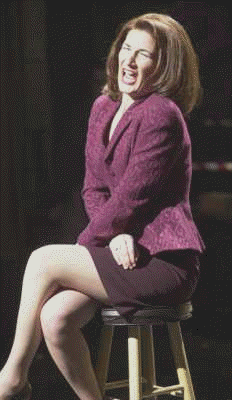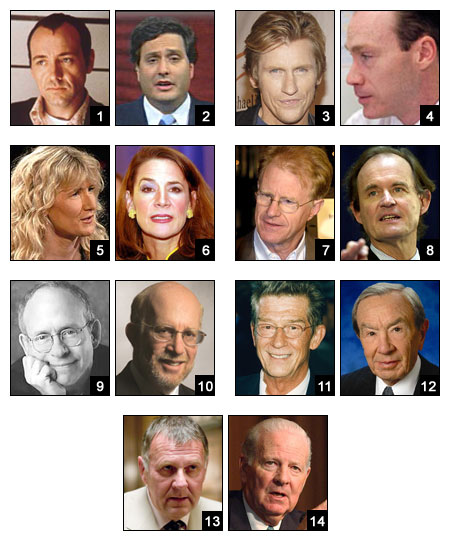

I saw an ad for HBO's 'Recount' today....I like HBO films, and thier John Adams is superb. But I am wary that the whole thing will not be portrayed correctly...
Denis Leary as a Democratic pollster, Tom Wilkinson as Republican James Baker, Bob Balaban as the lead Bush/Cheney attorney, Ed Begley Jr. as the Democrats' lead attorney, and ... (dramatic pause) ... Laura Dern as former Secretary of State Katherine Harris. (An interesting choice. Wonkette wanted Glenn Close or Ellen Barkin; Radar Online suggested Sean Young or, um, Andy Dick.) Jay "Austin Powers" Roach will direct the drama, which will air ....you guessed it....during the heat of the 2008 presidential election.
I can only imagine how this will go. Laura as Katherine:
“Ok, Mr. Bush, I will take all the democrat ballots and throw them away. I made the butterfly ballot so difficult that only rocket scientists could figure it out. Now I am heading down to a black neighborhood to set up a police blockade so no black people can vote!”
Just a reminder, here are some 'truths' about Floriduh 2000 from John Lott:
1. THE MYTH OF THE FLAWED VOTING MACHINES & DEMOCRATIC DISENFRANCHISEMENT
Suppose spoiled or non-voted ballots really did indicate disenfranchisement, rather than voter preferences. Then, according to the precinct-level vote data compiled by USA Today and other newspapers, the group most victimized in the Florida voting was African-American Republicans, and by a dramatic margin, too.
Earlier this year I published an article in the Journal of Legal Studies analyzing the USA Today data, and it shows that African-American Republicans who voted were 54 to 66 times more likely than the average African American to cast a non-voted ballot (either by not marking that race or voting for too many candidates). To put it another way: For every two additional black Republicans in the average precinct, there was one additional non-voted ballot. By comparison, it took an additional 125 African Americans (of any party affiliation) in the average precinct to produce the same result.
Some readers may be surprised that black Republicans even exist in Florida, but, in fact, there are 22,270 such registered voters — or about one for every 20 registered black Democrats. This is a large number when you consider that the election in the state was decided by fewer than 1,000 votes. Since these Republicans were more than 50 times more likely to suffer non-voted ballots than other African Americans, the reasonable conclusion is that George W. Bush was penalized more by the losses of African-American votes than Al Gore.
Democrats have also claimed that low-income voters suffered non-voted ballots disproportionately. Yet, the data decisively reject this conclusion. For example, the poorest voters, those in households making less than $15,000 a year, had non-voted ballots at less than one-fifteenth the rate of voters in families making over $500,000.
It is difficult to believe that wealthy people were more confused by the ballot than poor people. Perhaps the rich or black Republicans simply did not like the choices for president and so did not vote on that part of the ballot. Perhaps there was tampering, but it is difficult to see how it could have been carried out and covered up. We may never know, but, clearly, the figures show that income and race were only one-third as important in explaining non-voted ballots as the methods and machines used in voting. For example, setting up the names in a straight line appears to produce many fewer problems than listing names on different pages or in separate columns.
2. THE MYTH THAT AFRICAN AMERICANS WERE INCORRECTLY PLACED ON THE CONVICTED-FELONS LIST AT A HIGHER RATE THAN OTHER GROUPS
The evidence on convicted felons comes from the U.S. Civil Rights Commission's Majority Report, which states: "The chance of being placed on this list [the exclusion list] in error is greater if the voter is African-American." The evidence they provide indicates that African-Americans had a greater share of successful appeals. However, since African-Americans also constituted an even greater share of the list to begin with, whites were actually the most likely to be erroneously on the list (a 9.9-percent error rate for whites versus only a 5.1-percent error rate for blacks). The rate for Hispanics (8.7 percent) is also higher than for blacks. The Commission's own table thus proves the opposite of what they claim. A greater percentage of whites and Hispanics who were placed on the disqualifying list were originally placed there in error.
In any case, this evidence has nothing to do with whether people were in the end improperly prevented from voting, and there are no data presented on that point. The Majority Report's evidence only examines those who successfully appealed and says nothing about how many of those who didn't appeal could have successfully done so.
3. THE MYTH THAT GORE WOULD HAVE WON IF RECOUNT HAD ONLY BEEN ALLOWED
There were two news consortiums conducting massive recounts of Florida's ballots. One group was headed by USA Today and the Miami Herald. The other one was headed by eight newsgroups including the Washington Post, New York Times, L.A. Times, Chicago Tribune, the Associated Press, and CNN. Surprisingly, the two groups came to very similar conclusions. To quote from the USA Today group's findings (May 11, 2001) on different recounts:
Who would have won if Al Gore had gotten the manual counts he requested in four counties? Answer: George W. Bush.
Who would have won if the U.S. Supreme Court had not stopped the hand recount of undervotes, which are ballots that registered no machine-readable vote for president? Answer: Bush, under three of four standards.
Who would have won if all disputed ballots — including those rejected by machines because they had more than one vote for president — had been recounted by hand? Answer: Bush, under the two most widely used standards; Gore, under the two least used.
Of course, Florida law provided no mechanism to ask for a statewide recount a la the last option, only county-by-county recounts. And of course neither Gore's campaign nor the Florida Supreme Court ever asked for such a recount.
4. DON'T FORGET THE EARLY MEDIA CALL
Florida polls were open until 8 P.M. on election night. The problem was that Florida's ten heavily Republican western-panhandle counties are on Central, not Eastern, time. When polls closed at 8 P.M. EST in most of the state, the western-panhandle polling places were still open for another hour. Yet, at 8 Eastern, all the networks (ABC, CBS, CNN, FOX, MSNBC, and NBC) incorrectly announced many times over the next hour that the polls were closed in the entire state. CBS national news made 18 direct statements that the polls had closed.
Polling conducted after the election indicates that the media had an impact on voter behavior, and that the perception of Democratic wins discouraged Republican voters. Democratic strategist Bob Beckel concluded Mr. Bush suffered a net loss of up to 8,000 votes in the panhandle after Florida was called early for Gore. Another survey of western-panhandle voters conducted by John McLaughlin & Associates, a Republican polling company, immediately after the election estimated that the early call cost Bush approximately 10,000 votes.
Using voting data for presidential elections from 1976 to 2000, my own own empirical estimates that attempted to control for a variety of factors affecting turnout imply that Bush received as many as 7,500 to 10,000 fewer votes than he would normally have expected. Little change appears to have occurred in the rate that non-Republicans voted.
No comments:
Post a Comment